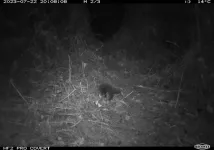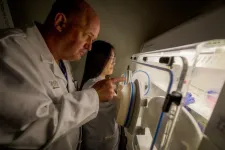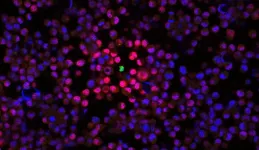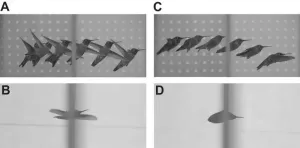(Press-News.org) Lisbon, Portugal: Patients with breast cancer in conflict zones around the world are being “massively under-served” by governments, UN aid agencies and other non-governmental organisations (NGOs), Professor Richard Sullivan told the Advanced Breast Cancer Seventh International Consensus Conference (ABC 7). [1]
Among people fleeing conflict zones, either displaced within their own country or across borders to other countries, patients with breast cancer are the “single largest group of cancer patients that present to UN agencies and international NGOs,” said Prof. Sullivan, who is director of the Institute of Cancer Policy and co-director of the Centre for Conflict and Health research at King’s College London (UK). Yet international agencies and organisations have no standard procedures or guidelines for providing appropriate treatment at the right time, and no plans or funding for rebuilding capacity once conflicts have finished but pathways and funding for accessing treatment have been destroyed.
“The result is that we lose what is often the one opportunity to provide primary treatment to these patients before the cancer has spread. In refugee camps, 85%-90% of women don’t look for help until their breast cancer is advanced. Women are often trapped long-term in refugee camps so new breast cancer cases continue to present. There is often minimal palliative care and many women die with huge suffering,” said Prof. Sullivan, who has worked in over 18 refugee camps over the last thirty years.
“Often refugees move across borders to access cancer care, often to countries that cannot cope with providing medical care for large influxes of patients and where there are language barriers and difficulties in long-term treatment and follow-up. For instance, 27% of cancer patients fleeing from Ukraine to Moldova in 2022 had breast cancer but they often experienced lengthy delays to both diagnosis and treatment. Thirty-five percent of Ukrainian patients presenting at the Krakow medical centre in Poland can only be treated with palliative care and, of these, 43% are patients with advanced breast cancer.
“For all these breast cancer patients, there are difficulties not only in accessing surgery, but also radiotherapy and systemic therapies, including basic chemotherapy and endocrine therapy.”
Prof. Sullivan is calling for organisations involved in providing medical care in conflict affected regions, ranging from Ukraine, Syria, Sudan and Somalia to Uganda, Gaza, Afghanistan and Venezuela, to develop context-specific models of care for breast cancer.
“People are not being treated according to their needs, or according to the region they are in. One size does not fit all in conflict zones,” said Prof. Sullivan. “There needs to be conflict-specific planning. This is simply not being done at the moment. UN agencies and NGOs have yet to adequately address this specifically vulnerable population. They don’t understand that providing appropriate healthcare in war zones is very complex and that needs vary from country to country and conflict to conflict.”
He is calling for:
Standard operating procedures for addressing breast cancer and advanced breast cancer. These should build in capability for treating patients onsite in refugee camps, for example breast cancer surgery;
Guidelines, stratified by region and conflict, that identify funding or sources of funding to provide the appropriate care;
Long-term planning and funds for rebuilding pathways for cancer diagnosis and treatment after a conflict has finished.
Men as well as women can develop breast cancer, but Prof. Sullivan said that war has a disproportionate impact on women and children.
“Among displaced populations, about two-thirds are women and children. Some 265 million women are living today in armed conflict regions. This is a significant global population and a large proportion will need cancer care at some point.”
In 2022, the UNHCR reported that the war in Ukraine had created the fastest and one of the largest displacements of people since the Second World War, significantly increasing the numbers of displaced people worldwide to an estimated 103 million. By mid-2022, 5.4 million refugees had fled Ukraine and a further 6.3 million were displaced within the country. [2]
Chair of the ABC 7 conference, Dr Fatima Cardoso, Director of the Breast Unit of the Champalimaud Clinical Centre, Lisbon, Portugal, and President of the ABC Global Alliance, said: “Women in conflict zones have already suffered enough as a result of the upheaval and dangers they face. Developing breast cancer is yet another burden, but it should not be a death sentence. If it’s diagnosed and treated early, it is curable. But too many women, and sometimes men, are presenting with advanced breast cancer as a result of the conditions they face in refugee camps or the countries to which they have fled.
“We call upon UN aid agencies and NGOs to put in place plans and procedures to ensure that these patients are diagnosed and treated quickly and effectively. Despite the difficulties of implementing such plans, it should not be beyond the capabilities of these organisations to do this, so as to ensure that patients with breast cancer are not failed twice: once by conflict, and once by aid agencies who, currently, are not providing the necessary medical care.”
(ends)
[1] This release relates to the following presentation made on Friday 10 November in the session “The perfect storm: war, recession, regulatory/payers hurdles”, 15.50-17.05 hrs GMT: “Caring for cancer patients amidst war”, by Richard Sullivan.
[2] “Mid-year trends 2022”, UNHCR: https://www.unhcr.org/mid-year-trends
END
Aid agencies are failing patients with breast cancer in war zones meaning more will develop advanced disease
2023-11-10
ELSE PRESS RELEASES FROM THIS DATE:
Is the US reporting system for vaccine safety broken?
2023-11-10
Is the US reporting system for vaccine safety broken?
Investigation raises concerns that the system is not operating as intended and signals are being missed
A US reporting system designed to detect potential safety issues with vaccines is supposed to be user-friendly, responsive, and transparent. But an investigation published by The BMJ today finds it’s not meeting its own standards.
The Vaccine Adverse Event Reporting System (VAERS), co-managed by the US Centers for Disease Control and Prevention (CDC) and the Food and Drug Administration (FDA), collects reports of symptoms, ...
Gut bacteria protects against diarrhoeal disease
2023-11-10
Gut bacteria protects against diarrhoeal disease
Peer reviewed - Systematic review – people and animals
The severity of a diarrhoeal disease could be down to the bacteria in your gut – according to new research from the University of East Anglia.
Cryptosporidiosis is responsible for over 100,000 deaths annually – predominantly in children under five.
It also affects animals, and a new study published today shows that large animals – including primates - with less different ...
Found at last: Bizarre, egg-laying mammal finally rediscovered after 60 years
2023-11-10
A long-beaked echidna named after Sir David Attenborough and last seen by scientists in 1961 has been photographed for the first time in an Indonesian tropical forest.
An international team of researchers worked with local communities to deploy over 80 camera traps to film the elusive animal.
Besides rediscovering the echidna, the team uncovered a wealth of species completely new to science, including beetles, spiders, and a remarkable tree-dwelling shrimp.
A wide range of images and video footage from the expedition are available (see link below).
More than sixty years after it was last recorded, an expedition ...
WHO updates its guidance on treatments for COVID-19
2023-11-10
A panel of international experts representing the World Health Organization’s Guideline Development Group has updated its guidance on treatments for patients with covid-19.
The new recommendations published by The BMJ are part of a living guideline, developed by the World Health Organization with the methodological support of MAGIC Evidence Ecosystem Foundation, to provide up to date, trustworthy guidance on the management of covid-19 and help doctors make better decisions with their patients.
The guidance ...
UTHealth Houston researchers awarded $2.6 million NIH grant to study molecular pathways and potential strategies for treatment of myocardial ischemia and reperfusion injury
2023-11-10
A four-year, $2.6 million grant to study circadian rhythm and novel therapies to protect the heart during a heart attack or cardiac surgery has been awarded to UTHealth Houston by the National Heart, Lung, and Blood Institute, part of the National Institutes of Health.
Principal investigator Holger Eltzschig, MD, PhD, professor, and co-investigator Wei Ruan, MD, PhD, assistant professor, from the Department of Anesthesiology, Critical Care and Pain Medicine at McGovern Medical School at UTHealth Houston, are studying translational, pharmacologic, and interventional strategies targeting ...
What human diseases can teach us about the immune system
2023-11-10
The immune system is a crucial part of our survival, regularly fending off wide-ranging attacks on the body, both internal and external. Unsurprisingly, the elegant defense system that protects us from viruses, bacterial infections, cancer, and other threats is immensely complicated. Each time it mounts a response, it must quickly and carefully orchestrate communication across vast numbers of cells and molecules.
Jennifer Oyler-Yaniv is working to figure out how, exactly, the immune system does this — and when and why it fails.
“There's always the next question, the next ...
Texas A&M researchers contribute to international project studying coronavirus transmission in humans, cattle
2023-11-10
Researchers from the Texas A&M School of Veterinary Medicine and Biomedical Sciences’ (VMBS) Veterinary Education, Research, and Outreach (VERO) program have joined an international team studying how coronaviruses are spread and whether an individual’s microbiome (the collection of microbes living in or on the body) might impact that transmission.
Coronaviruses are a family of viruses that can cause a variety of diseases in many species, from the common cold and severe acute respiratory syndrome (SARS) in people, to diarrhea in calves and respiratory disease in ...
NASA’s Webb, Hubble telescopes combine to create most colorful view of universe
2023-11-10
Astronomers once again have combined the observational powers of NASA’s James Webb Space Telescope and Hubble Space Telescope to create one of the most detailed and colorful portraits of the cosmos, just in time for the holiday season.
The new image, dubbed the Christmas Tree Galaxy Cluster by the research team that includes Texas A&M University astronomer Dr. Lifan Wang, combines visible light from Hubble with infrared light detected by Webb to showcase MACS0416, a galaxy cluster about 4.3 billion light-years from Earth. Because the cluster is able to magnify the light from more distant background galaxies through a phenomenon known as gravitational ...
Ten 2023 postdoctoral fellowships in aging research awarded by the Glenn Foundation for Medical Research and AFAR
2023-11-10
NEW YORK, NY and SANTA BARBARA, CA — The American Federation for Aging Research (AFAR) and the Glenn Foundation for Medical Research are pleased to announce the recipients of the 2023 Glenn Foundation for Medical Research Postdoctoral Fellowships in Aging Research. This program supports postdoctoral fellowswho study basic research mechanisms of aging and/or translational findings that have potential to directly benefit human health.
Selected through a rigorous review process, ten, one-year, $75,000 Postdoctoral ...
Mystery solved: how hummingbirds fly through gaps that are too small
2023-11-10
Soaring, wings outstretched, many birds sail through the air unhindered. However, species that dine on fruit, seeds and nectar must negotiate tiny gaps in cluttered foliage to secure a feast. To pass through apertures, many birds pull in their wings, folding them closer to their bodies. However, some of the most manoeuvrable aviators, hummingbirds, have lost the ability to fold their wings at the wrists and elbows. ‘Unless hummingbirds implement distinctive strategies to transit narrow apertures, they may be unable to enter gaps less than one wingspan wide’, ...




